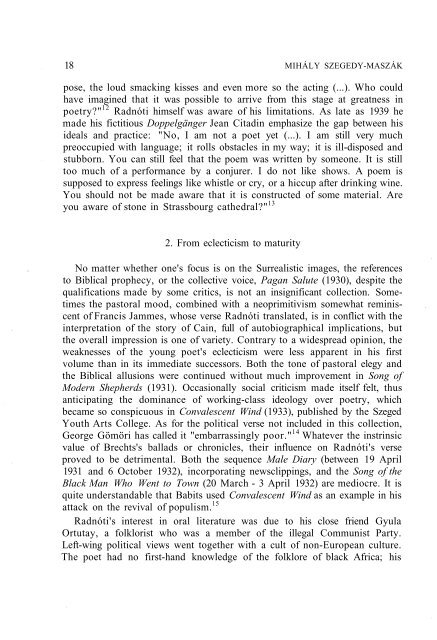HUNGARIAN STUDIES 11. No. 1. Nemzetközi Magyar ... - EPA
HUNGARIAN STUDIES 11. No. 1. Nemzetközi Magyar ... - EPA
HUNGARIAN STUDIES 11. No. 1. Nemzetközi Magyar ... - EPA
- No tags were found...
You also want an ePaper? Increase the reach of your titles
YUMPU automatically turns print PDFs into web optimized ePapers that Google loves.
18 MIHÁLY SZEGEDY-MASZÁKpose, the loud smacking kisses and even more so the acting (...). Who couldhave imagined that it was possible to arrive from this stage at greatness inpoetry?" 12 Radnóti himself was aware of his limitations. As late as 1939 hemade his fictitious Doppelgänger Jean Citadin emphasize the gap between hisideals and practice: "<strong>No</strong>, I am not a poet yet (...). I am still very muchpreoccupied with language; it rolls obstacles in my way; it is ill-disposed andstubborn. You can still feel that the poem was written by someone. It is stilltoo much of a performance by a conjurer. I do not like shows. A poem issupposed to express feelings like whistle or cry, or a hiccup after drinking wine.You should not be made aware that it is constructed of some material. Areyou aware of stone in Strassbourg cathedral?" 132. From eclecticism to maturity<strong>No</strong> matter whether one's focus is on the Surrealistic images, the referencesto Biblical prophecy, or the collective voice, Pagan Salute (1930), despite thequalifications made by some critics, is not an insignificant collection. Sometimesthe pastoral mood, combined with a neoprimitivism somewhat reminiscentof Francis Jammes, whose verse Radnóti translated, is in conflict with theinterpretation of the story of Cain, full of autobiographical implications, butthe overall impression is one of variety. Contrary to a widespread opinion, theweaknesses of the young poet's eclecticism were less apparent in his firstvolume than in its immediate successors. Both the tone of pastoral elegy andthe Biblical allusions were continued without much improvement in Song ofModern Shepherds (1931). Occasionally social criticism made itself felt, thusanticipating the dominance of working-class ideology over poetry, whichbecame so conspicuous in Convalescent Wind (1933), published by the SzegedYouth Arts College. As for the political verse not included in this collection,George Gömöri has called it "embarrassingly poor." 14 Whatever the instrinsicvalue of Brechts's ballads or chronicles, their influence on Radnóti's verseproved to be detrimental. Both the sequence Male Diary (between 19 April1931 and 6 October 1932), incorporating newsclippings, and the Song of theBlack Man Who Went to Town (20 March - 3 April 1932) are mediocre. It isquite understandable that Babits used Convalescent Wind as an example in hisattack on the revival of populism. 15Radnóti's interest in oral literature was due to his close friend GyulaOrtutay, a folklorist who was a member of the illegal Communist Party.Left-wing political views went together with a cult of non-European culture.The poet had no first-hand knowledge of the folklore of black Africa; his
















